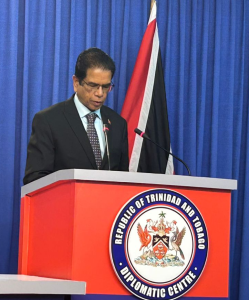
IN a media release on January 30, 2023, the public was informed of the intention of the Rules Committee of the Judiciary to change the regime by which court fees are paid for civil matters.
Currently, the Chief Justice has in place an ongoing waiver of payment of court fees for all documents filed electronically. This has more or less been the case since the introduction of the electronic filing of documents, and the prohibition of physical filings, shortly after the onset of the Covid-19 pandemic three years ago.
Before the pandemic, a traditional non-novel civil lawsuit, for example, for a debt collection on an unpaid loan, attracted about $200 or thereabout in court fees per litigant for physically filed documents: [the claim form and Statement of Case – $70; $10 to $20 for documents filed in preparation for trial e.g. List of Documents, Statement of Facts; Statement of Issues; and Witness Statements. The court filing fees for applications were $20 for the Notice of Application and $10 for every supporting affidavit.]

The cost to lawyers for filing documents in court is normally invoiced to our clients. But, as can be seen from the examples above, the fees at present, are reasonable.
Based on the said media release, a radical change is being proposed, where court fees are paid in phases, instead of per document, as is currently the case. A single fee will be charged at the following stages as a case progresses towards trial:
a. Filing and Response stage – (currently an average expense of $90.00 for the Claimant);
b. Case Management stage – (currently an average expense of $110.00 for the Claimant, if 3 witnesses at trial);
c. Pre-Trial Review and Trial stage – (no court fees are applicable at this stage, as there is no cost for filing submissions or trial bundles);

The media release stated no other filing fees will be charged along the way and there will be no fees for official copies. The rationale for the pay-in-stages system may be found in this statement in the media release: “The system of paying for phases also incentivizes early settlement as opposed to dragging out a case.”
The media release did not disclose what the Rules Committee are proposing as the intended new court fees. I must add that these radical proposed changes were not generally known to the public, nor the general legal profession, until an article on the same was published by a local media house on January 29, 2023. If what is stated in that article is true, some of the increases the Rules Committee are proposing include the following:
a. Filing the claim – $500 for an electronic filing or $1,000 for paper filing;
b. Where the Defendant files a Defence and Counterclaim – $500 for an electronic filing or $1,000 for paper filing;
c. Case Management stage – $100 to $400 in respect of E-Filing and $200 to $800 in respect of paper filing;
d. Pre-Trial Review and Trial stage – $800 to $1,000 for E-Filing and $1,000 to $2,000 for paper filing.
By my calculation, under the new fee regime, a Claimant will now need to pay at minimum $1,400 in court fees alone for electronic filings, instead of the $200 calculated above.
These are indeed hefty and onerous court fees for the public to pay to litigate their matter in court, as a penalty for not settling their matter. I agree that settlement is the gold standard for resolution of a dispute and highly desirable, but it is not always possible or just. Further, I am not inherently amenable to the “Peter pays for Paul” argument to justify the pay-in-stages system in circumstances where all other court fees are waived. To me, that is unjust. Let litigants pay per the document that they wish to file.

With respect to the quantum of court fee increases being proposed, the Rules Committee probably needs to read the room and take heed of general public opinion as seen in matters such as the RIC public consultations on T&TEC’s proposed rates increases.
I trust that the Rules Committee will seek consultations with the legal profession and public at large before moving forward on their proposals. Equally, I am sure, we will all have a lot to contribute that will give the Rules Committee food for thought to do what’s best for the public they serve. Be safe T&T!
Copyright © 2023 Neela Ramsundar, LL.B (HONS), L.E.C is a Civil Litigation Attorney at Law & Certified Mediator.
Disclaimer: The contents of this article are for general informational purposes only and/or contain the opinions and/or thoughts of the writer only. It does not provide legal advice and does not create an attorney-client relationship with any reader. For legal advice on your specific situation, please contact an attorney-at-law directly. Liability for any loss or damage of any kind whatsoever allegedly incurred as a consequence of relying on content in this article is thus hereby excluded to the fullest extent permitted by law.
![]()











